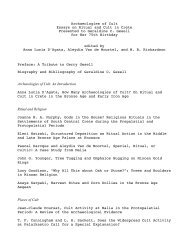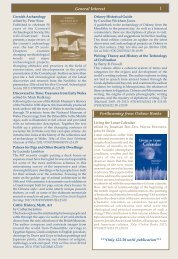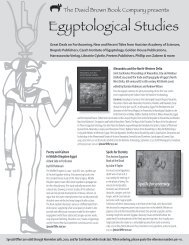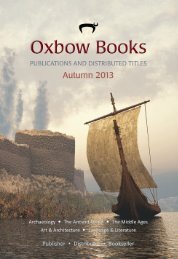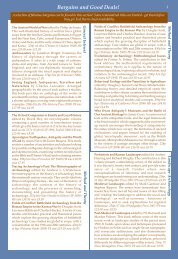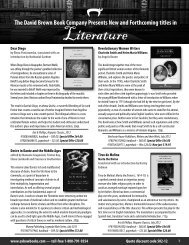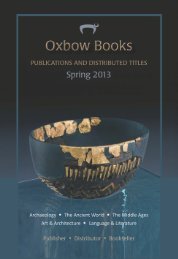New Distributed Titles Fall 2009 - Oxbow Books
New Distributed Titles Fall 2009 - Oxbow Books
New Distributed Titles Fall 2009 - Oxbow Books
You also want an ePaper? Increase the reach of your titles
YUMPU automatically turns print PDFs into web optimized ePapers that Google loves.
cultural studies � anthropology<br />
Konflikte – Mächte – Identitäten<br />
edited by Martin Slama<br />
The articles in this volume analyze the current conflicts, asymmetries of power, and<br />
often-contested identities in today’s postcolonial Southeast Asia. Social anthropological<br />
methods – such as detailed empirical studies and their long tradition of research on<br />
ethnicity/identity – are particularly valuable when considering those parts of Southeast<br />
Asia, especially peripheral regions and border zones, that are afflicted by violent conflicts.<br />
While a number of articles in this volume focus on recent conflicts, others concentrate on<br />
Southeast Asian concepts of power in general. They not only examine symbolic domination<br />
structures, but also how concepts of power are imposed, used, and undermined in<br />
everyday life, especially within gender relations.<br />
324p, b/w illus, paperback, 9783700166092, $54.00(s), Austrian Academy of Sciences, October <strong>2009</strong>,<br />
Beiträge zur Sozialanthropologie Südostasiens.<br />
Die Vermessung der Kultur<br />
Der Atlas der deutschen<br />
Volkskunde und die Deutsche<br />
Forschungsgemeinschaft 1928-1980<br />
by Friedemann Schmoll<br />
Der Atlas der deutschen Volkskunde (The Atlas<br />
of German Folklore) is one of the biggest longterm<br />
cultural research projects of 20th-century<br />
Germany. Initiated after WW I and active under<br />
the political systems of the Weimar Republic,<br />
the Third Reich, the FRG and the GDR, several<br />
generations of anthropologists worked on the survey and cartographic mapping of<br />
a “folk culture” endangered by industrialization and modernization. Millions of data<br />
were collected within and outside the German Reich that pertain to everyday life,<br />
farm work, customs and conventions, feasts, holidays and rituals, diet, religious beliefs,<br />
and more. German text.<br />
331p, paperback, 9783515092982, $77.00(s), Franz Steiner Verlag, June <strong>2009</strong>,<br />
Studien zur Geschichte der Deutschen Forschungsgemeinschaft 5.<br />
Die Verkleinerung der Yakhautboote<br />
Fischerkulturen in Zentral- und Südtibet<br />
im sozioökonomischen Wandel des modernen China<br />
by Diana Altner<br />
Boats made from Yak skin – used as ferries or for fishing – were a hallmark of the rivers<br />
of Central Tibet until the beginning of the last century. On the example of the last<br />
fishing village in that region, this study analyzes the changes brought about by the<br />
political, social, and economic transformations of modern China and their implications<br />
for Central Tibet’s fishing industry and the Yak skin boats. German text.<br />
284p, paperback, 9783447059039, $93.00(s), Harrassowitz Verlag, July <strong>2009</strong>.<br />
The Baloch and Their Neighbors<br />
– The Baloch and Others<br />
Two-Volume Set<br />
edited by Agnes Korn and Carina Jahani<br />
Makes available as a set two of Reichert Verlag’s important ethnographic works<br />
on Balochistan: The Baloch and Their Neighbours: Ethnic and Linguistic Contact in<br />
Balochistan in Historical and Modern Times (2003) and The Baloch and Others:<br />
Linguistic, Historical and Socio-Political Perspectives on Pluralism in Balochistan<br />
(2008).<br />
2 vols, 780p, 17 maps, hardback, 9783895006821, $168.00(s), Reichert Verlag,<br />
May <strong>2009</strong>.<br />
Briefwechsel Joseph Franz Rock<br />
mit Johannes Schubert 1935–1961<br />
edited by Manfred Taube<br />
Joseph Franz Rock (1884–1962), born in Vienna and later a resident of Hawaii,<br />
was well known as a botanist, geographer, philologist and linguist. From 1922<br />
to 1949 he lived in China, where he studied the language and culture of the<br />
Na-khi, a people living in Yunnan between the Han Chinese and the Tibetans.<br />
Through his research, he became acquainted with the Tibetologist and Mongolist<br />
Johannes Schubert (1896–1976), librarian at the University of Leipzig and later<br />
professor at the Eastern Asian Institute of the same university. They corresponded<br />
quite extensively for over a quarter of a century. Rock’s letters give a vivid picture<br />
of his long stay among the Na-khi people, of his scientific research, and – following<br />
his flight from China in 1949 – of his restless later life and his travels in<br />
Asia, America and Europe. Much can also be learned about Schubert’s research<br />
from his letters. German text.<br />
316p, paperback, 9783700165637, $57.00(s), Austrian Academy of Sciences,<br />
October <strong>2009</strong>, Beiträge zur Kultur- und Geistesgeschichte Asiens.<br />
www.dbbconline.com 89



